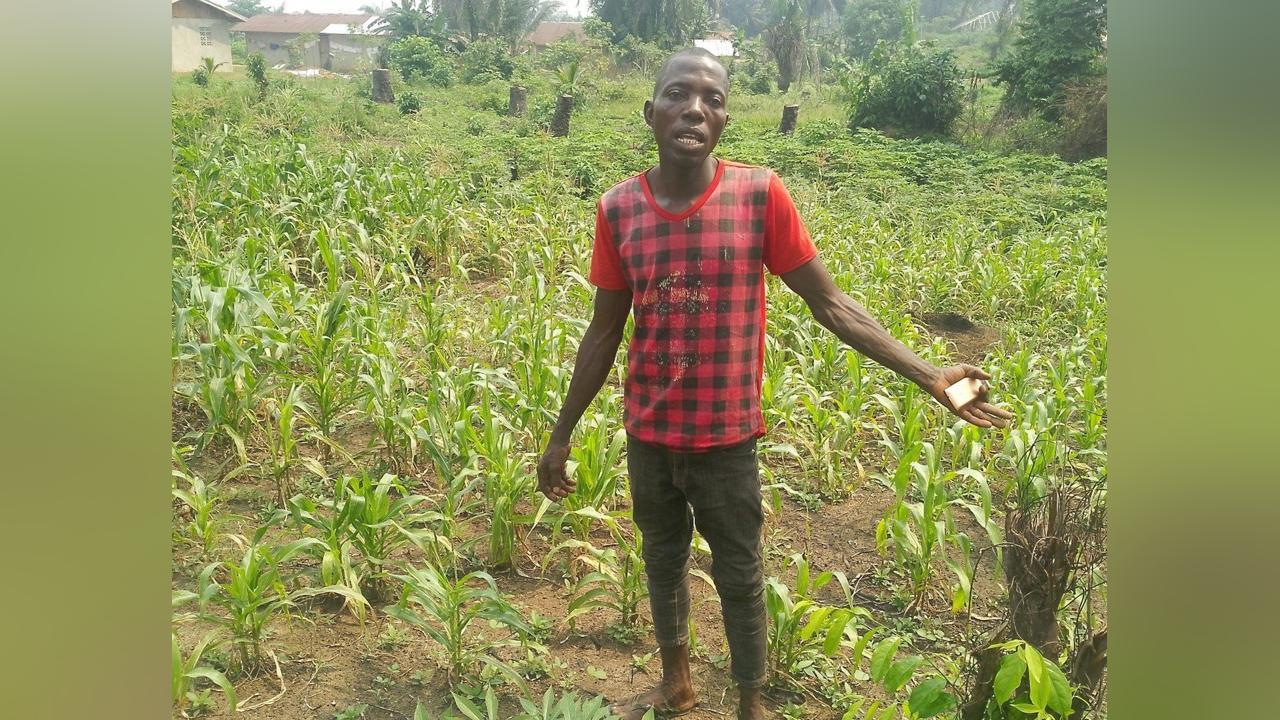
Africa-Press – Liberia. A major national FrontPageAfrica/New Narratives survey has found nine in every ten Liberian subsistence farmers want to migrate because climate change is making farming unviable. With as many as 80 percent of Liberians making their living from farming, experts say the findings have major implications for Liberia’s food security and exposes vulnerable Liberians to extreme dangers from those seeking to exploit them.
The survey of 300 farmers, half of them women, aged 40 years or under, in five counties – River Cess, Nimba, Bong, Montserrado and Grand Bassa – found most (73 percent) of those who wanted to migrate were seeking better economic opportunities while the rest sought education. Some were planning to migrate internally – to illegal mine sites, or to the capital Monrovia – or to the regional economic powerhouse of Nigeria. But more than two in every three had their sights set on traveling outside Africa with the United States being the most favored destination.
Many survey respondents were already making plans. Those with better access to the internet were more likely to be speaking with people online who, experts warn, are likely traffickers or scammers seeking to profit from their desperation. Up to 10 percent of participants appeared to already be in conversation with potential scammers.
“You got to be careful who you talk to on social media,” warns Mercy Pyne, Assistant Director at the Ministry of Labor’s Human Trafficking Division. She points to hundreds of people who have been lured into modern slavery scams in the Middle East in recent years. Many have not returned. “They keep leaving Liberia thinking they will get better living but every time they go there they see it’s not better. When you are caught sometimes they take your organ, they take your living parts from you to sell it. Sometimes you don’t live to tell the story.”
Liberia is at the center of global concerns about a large uptick in numbers of people migrating and dying in illegal trafficking routes. A record 110 million people were displaced in 2022 and 8,000 deaths were recorded mostly on routes from Africa to Europe and from South America to the United States.
The Sahel and Equatorial Africa have been one of the areas hardest hit by climate change.
A 2022 report called Africa Shifts projected that number of Africans migrating annually because of climate change will increase from 1.5 percent today to as many as 5 per cent, or 113 million people, by 2050.
The number of Africans migrating because of climate change could reach 113 million people by 2050.
Here in this central River Cess County the damage of climate change is clear. On the day this reporter visited in mid-March the villagers woke prepared to burn land to clear it for farming, only to be hit with a heavy downpour of rain. ‘Slash and burn,’ is the primary method of farming here. Farmers burn the underbrush, then fell the trees to make room to plant in fertile soil. (Experts say this approach is destroying Liberia’s biodiversity and threatening to turn forests into infertile grassland, but with no other information about how to farm many people here rely on practices passed down for generations.)
For as long as any remembers rainy season began a month later, in mid-April and ends mid-October. Farmers say they can no longer depend on regular rainfall patterns. Even if the crops are planted, farmers say plants will shrivel from increased sun and pests.
Farmer Alex Konway, 34, has made up his mind to leave the country in search of a better life. For the past three years, his harvests have failed. Things look bad this year too.
“I don’t know book, but I know what happening is climate change,” says Konway. “I have been farming for years, so I know when farms supposed to burn. We are in March, almost entering April and heavy rain falling. Rain used to fall in March, but not like this. This year if my farm [does] not burn, it means I will not get food for next year. Even the corn I planted, they just getting dry because of the sun. That all that one make it I want to leave from here.”
Konway’s corn farm is being impacted by severe sunshine: Photo by Eric Opa Doue
Meshach Saybahnjay is 24 years old. His mother had paid for his education using funds raised from peppers and bitter balls she sold from her farms. It is five years since Saybahnjay finished high school. He says his mother no longer makes money from her farms.
“I can’t continue to stay here doing nothing and suffering at the same time,” says Saybahnjay. “I want to go abroad to go out of the country to look for job and live a better life.”
Another farmer here, 37-year-old Emmanuel Pertie Karr, wants to go overseas for an education. He is looking for scholarships.
“I want to go abroad to study agriculture to come back and help my people,” says Karr.
But experts say there are few, if any, scholarships available for Liberians without an exceptional academic record.
In River Cess 12 percent of those interviewed said they wanted to go to an illegal mining site in Liberia or get a job with a logging company. They were planning to migrate to one of those sites. Illegal mining sites have become an increasing lure for farmers as climate change has escalated. The sites themselves are unsupervised and dangerous. Last month’s mudslide at Chio Town Mine near here claimed the lives of eleven people. Drug use and prostitution around illegal mine sites adding to the dangers faced by migrants.
Onesimus Morris is one of the respondents who wants to leave because of bad harvest: Photo by Eric Opa Doue/NN
Many Liberians have heard about the trafficking scams that have ensnared people. In Belefenai Town, 15 miles away from Bong County’s capital Gbargna, everyone knows of four men from the town who were lured to Dubai. One was killed, and two are still trapped in Dubai.
Kelvin Kollie Jr. is the only one who made it home. The 27-year-old sits on a big rock, taking a break from the depleted farm that had sent him overseas in the first place. He explains how three men were lured by a friend from the town named Joshua Kpakulah who had already gone to Dubai.
“He lied to me, my parents and I spent hugely,” says Kollie. “I trusted him because he is from here but with he did to me will never be forgotten.”
Kollie looks down as he recalls the horrors he and his friends suffered. Upon his arrival in Dubai, the scam became clear.
“Even the man I went to is not living a better life,” he says. “His only source of survival has been tracking people online to collect money from them. We were about 25 men lodging in a single room with a lot of us contracting diseases. I do not want to tell you some of the things I did just to eat. Each time I think about it, I cry. I did so many horrible things. We waited around the trash cans up to the evening so that the Arab men can bring their left-over food. The moment they brought it, we were safe from starvation.”
Kelvin says his visa expired and he was unable to work. He says in order to get the documents he needed to leave Dubai, authorities made him agree never to return. Kelvin’s parents had to borrow an additional $1400 for his plane ticket putting them further in debt.
Kollie told everyone in Belefenai Town and people listened. Only a handful there said they were willing to risk migrating. Personal interaction with a trafficking victim appeared to be a powerful deterrent.
But that was the only location where people said stories of the danger would stop them travelling. The number of people who had heard about bad outcomes from trafficking varied according to county and internet access. In Montserrado 100 percent had heard about bad things while in River Cess 72 percent have heard about bad things. Very few said the bad stories would stop them.
“Bad news will not stop me,” said Grace Chaddah an 18-year-old who had earlier migrated from Grand Gedeh County to River Cess for education. “In this life, you just have to take the risk to make it.”
Many, like Saybahnjay, had outsized confidence in their ability to spot a scam.
“It can’t stop me because life itself is a risk. No one prays for bad things to happen to them, but when it comes, you have nothing to do,” said Saybahnjay.
Here in River Cess County, two in every five respondents who want to leave were women underscoring the challenges women face. The UN recently reported that due to the pre-existing socio-economic vulnerabilities, 80 percent of those displaced by climate-related disasters are women.
More internet access meant more access to potential traffickers, but it also brought greater knowledge of the legitimate or safe ways of traveling overseas such as the US diversity visa lottery. People in towns and nearer to the capital Monrovia were more likely to tell stories that suggested they may have been in touch with traffickers already. Those in Bong and Nimba were less likely to have made plans than those in Montserrado or River Cess.
While anti-trafficking advocates say massive awareness campaigns are needed to raise awareness of the dangers of migrations agriculture experts are taking a second approach – trying to help farmers adapt.
“Currently in the whole world, all research stations are focusing on developing varieties that will adapt to the climate change,” saysJoseph Ndebeh, a research officer at the Central Agricultural Research Institute and lecturer at Cuttington University. He is breeding more resilient rice seedlings to help farmers adapt to the new weather conditions. “It is now the responsibility of government to make sure farmers are given the rightful planting materials if we want to combat food insecurity in Liberia.”
Ndebeh calls for the government to boost funding to researchers and farmers, to bring new technologies and crop varieties to build food security, reduce migration pressure and build resilience in the face of climate change.
Experts say until farmers are able to adapt and awareness campaigns get underway, Liberia’s farmers will face the dual risks of food insecurity and trafficking in growing numbers.
For More News And Analysis About Liberia Follow Africa-Press





